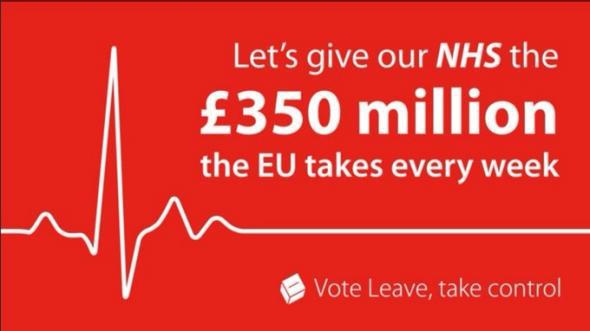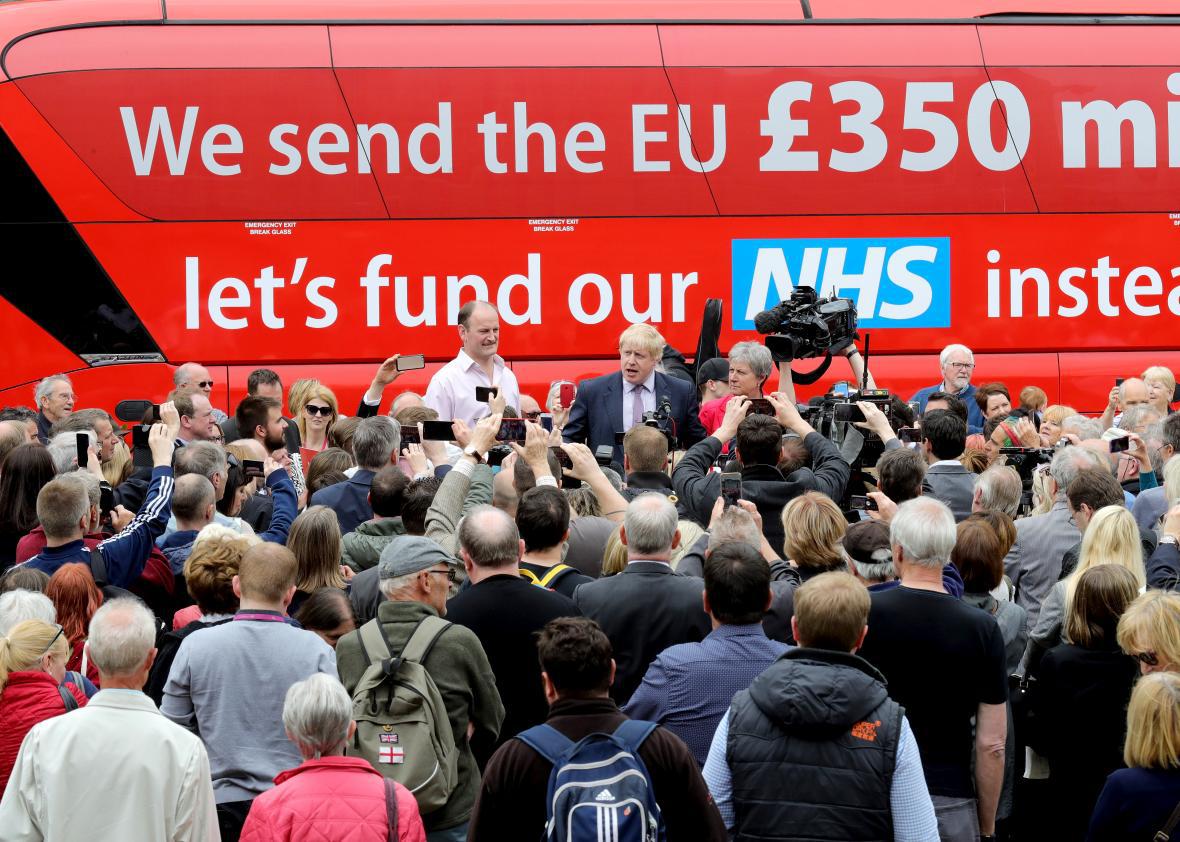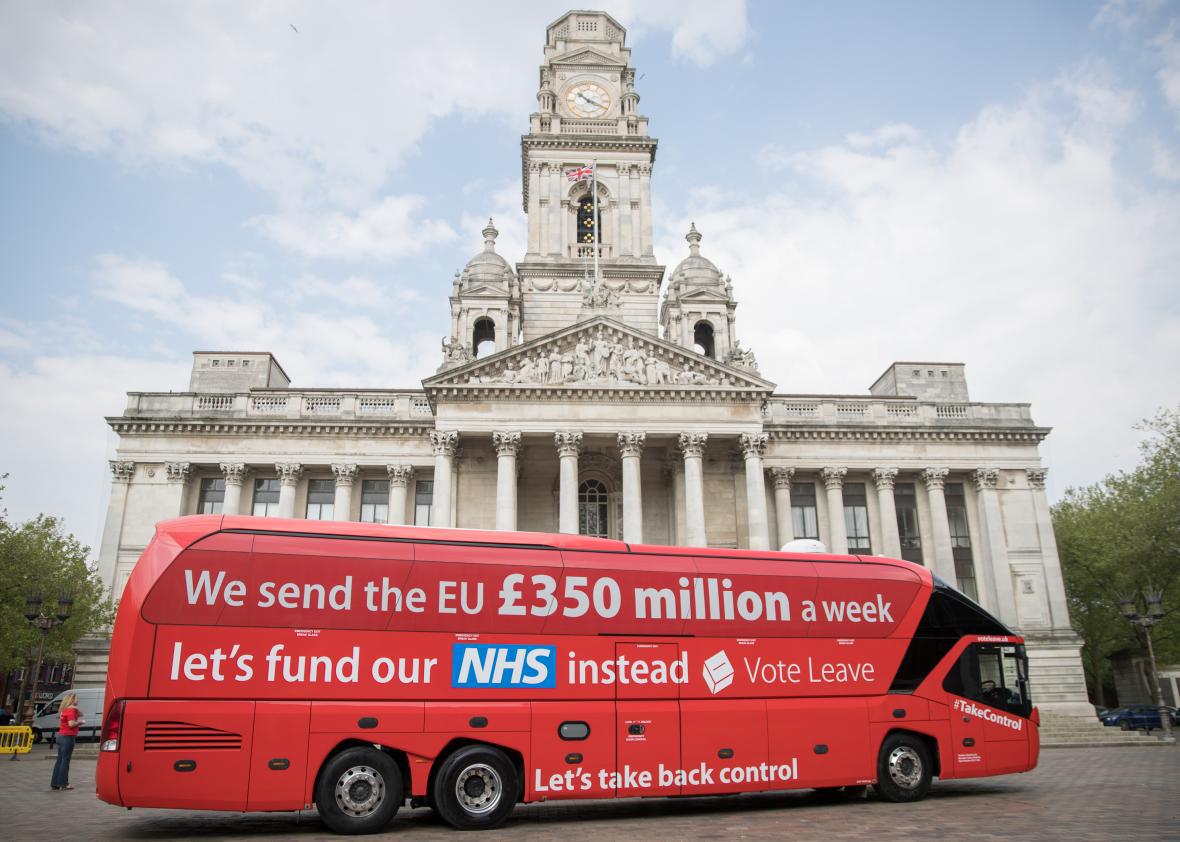During the lead-up to last week’s Brexit vote, one of the Leave campaign’s favorite talking points was that the United Kingdom could save 350 million pounds that it currently pays each week in membership dues to the European Union, and instead spend that money on things like funding the National Health Service. It splashed the message across its website and advertisements, including the very first billboard it unveiled.

Vote Leave
The campaign even emblazoned the argument on the side of a bus, which it used as a backdrop for appearances by pro-Brexit politicians like Boris Johnson. By June, 78 percent of the British said they were familiar with the 350 million pounds per week stat.

Christopher Furlong/Getty Images
There was a problem with that factoid, however: It was transparently untrue. Technically, the U.K. made a 19.1 billion pounds gross payment to the EU budget in 2014, which works out to a bit more than 350 million pounds weekly. But, thanks to Margaret Thatcher’s hard-nosed negotiating in the 1980s, the country also gets a large rebate, worth about 4.9 billion pounds, which never leaves Her Majesty’s Treasury. The Brits also benefit from billions in assorted EU public sector subsidies. Count it all up, and the U.K.’s net contribution comes out to about 9.9 billion pounds, just over half the total trumpeted by the Brexiteers. (The sum falls even further if you start factoring in things like the research dollars the EU provides to British universities.)
This has all left the “Leave” campaign in an awkward position since winning last Thursday’s referendum, as supporters have found themselves trying to explain away the obvious fact that the British public, almost half of which believed the fake stat, was mislead. The trouble started with an appearance by U.K. Independence Party leader Nigel Farage on ITV, during which host Susanna Reid interrogated him over the issue:
Reid: The 350 million pounds a week that we send to the EU, which we will no longer send to the EU, can you guarantee that’s going to go to the NHS?
Farage: No I can’t. And I would never have made that claim. And that was one of the mistakes I think the Leave campaign made.
Reid: Wait a moment. That was one of your adverts.
Farage: Well it wasn’t one of my adverts.
Farage went on to remind audiences that he had been more or less “ostracized” from the official “Leave” campaign—thus, he wasn’t responsible for the ads—and that the U.K. would still have a nice, 10 billion–pound “featherbed” to spend on things like the NHS and schools. This failed to appease Reid, whose righteous indignation helped the moment go viral. Since then, pro-Brexit politicians like Ian Duncan Smith and Chris Grayling have tried to point out that, if you read the fine print, the Leave campaign only promised to spend part of the money saved on EU membership dues on the NHS. “The specific proposal put forward by the Leave campaign was in fact to spend 100 million pounds a week of that on the NHS,” Grayling told ITV. “I hope that aspiration will be met when we leave.”*
He isn’t lying. The Leave campaign released just such a plan. And some politicians were in fact quite careful about their language regarding the 350 million pounds before the referendum. While the U.K. gets back much of its membership dues, they argued, leaving would allow the country to “take back control” of the money. Rather than promise new cash, they promised new power over where that cash would be spent.
Unfortunately, none of that really explains away all those ads leaving the distinct and obviously untrue impression that Brexit would mean almost 20 billion pounds a year for the NHS. The British press has started calling the effort to undo that implication—which may have included scrubbing the stat from the Leave campaign website—“operation backtrack.”
What’s interesting about 350 million pounds fabrication is just how inept it was. The Brexit campaign rested on a lot of half-truths and magical thinking, with its major supporters essentially arguing that, somehow or another, the U.K. would be able to withdraw from the European Union, then negotiate new trade deal giving it all the benefits of membership without any of the required sacrifices. But while that larger narrative might not have stood up to even the most casual interrogation, it’s not immediately falsifiable, and doesn’t necessarily make for easy gotcha moments on morning television the same way a faked stat does. Pointing to a pot of money that simply doesn’t exist and claiming—or at least forcefully implying—that it will all go toward a beloved health system is the sort of easy-to-process lie that seems destined to blow up, eventually.
It’s too bad the explosion didn’t come before last week’s vote.
*Correction, June 27, 2016: This post originally misquoted Grayling as saying the Leave campaign promised to spend only 100 pounds a week.
